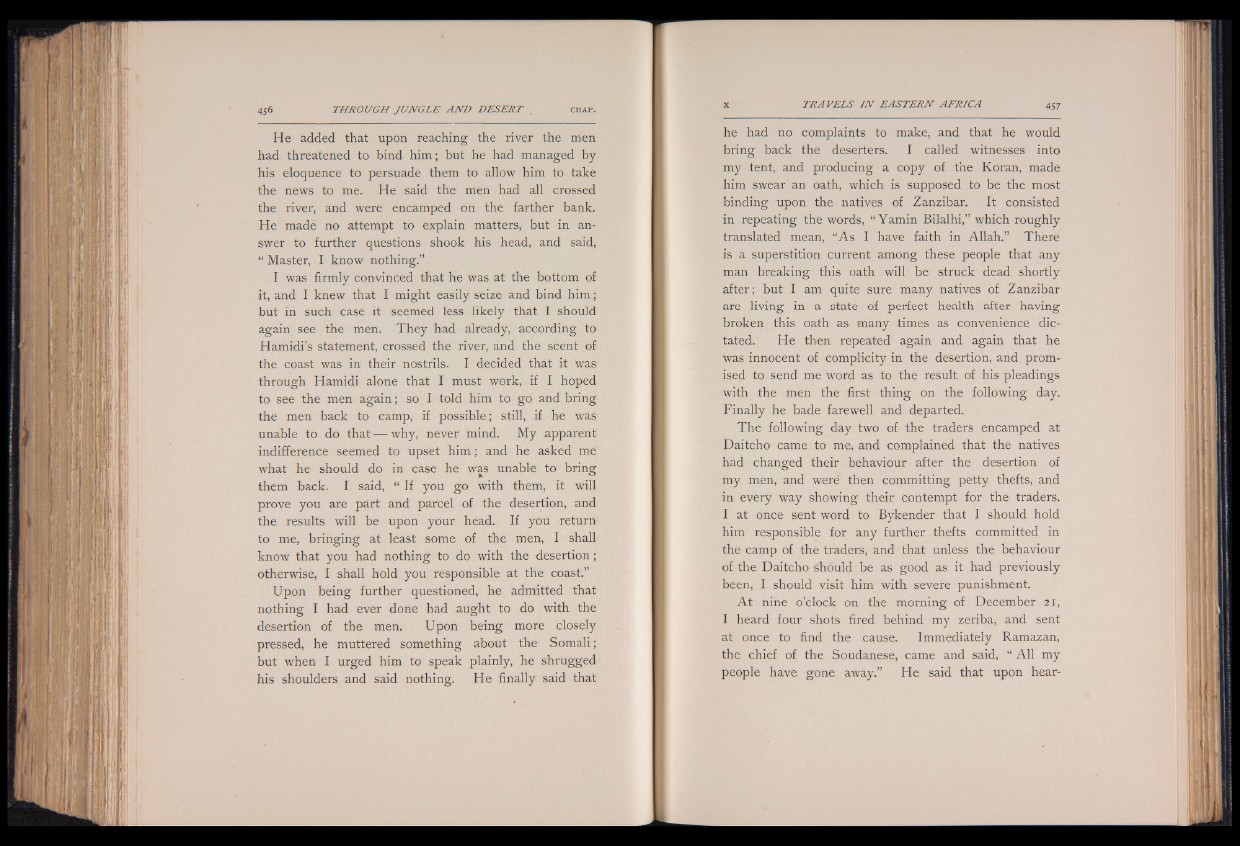
He added that upon reaching the river the men
had threatened to bind him; but he had managed by
his eloquence to persuade them to allow him to take
the news to me. He said the men had all crossed
the river, and were encamped on the farther bank.
He made no attempt to explain matters, but in answer
to further questions shook his head, and said,
“ Master, I know nothing.”
I was firmly convinced that he was at the bottom of
it, and I knew that I might easily seize and bind him;
but in such case it seemed less likely that I should
again see the men. They had already, according to
Hamidi’s statement, crossed the river, and the scent of
the coast was in their nostrils. I decided that it was
through Hamidi alone that I must work, if I hoped
to see the men again; so I told him to go and bring
the men back to camp, if possible; still, if he was
unable to do that — why, never mind. My apparent
indifference seemed to upset him; and he asked me
what he should do in case he was unable to bring
them back. I said, “ If you go with them, it will
prove you are part and parcel of the desertion, and
the results will be upon your head. If you return
to me, bringing at least some of the men, I shall
know that you had nothing to do with the desertion;
otherwise, I shall hold you responsible at the coast.”
Upon being further questioned, he admitted that
nothing I had ever done had aught to do with the
desertion of the men. Upon being more closely
pressed, he muttered something about the Somali;
but when I urged him to speak plainly, he shrugged
his shoulders and said nothing. He finally said that
he had no complaints to make, and that he would
bring back the deserters. I called witnesses into
my tent, and producing a copy of the Koran, made
him swear an oath, which is supposed to be the most
binding upon the natives of Zanzibar. It consisted
in repeating the words, “ Yamin Bilalhi,” which roughly
translated mean, “As I have faith in Allah.” There
is a superstition current among these people that any
man breaking this oath will be struck dead shortly
after; but I am quite sure many natives of Zanzibar
are living in a state of perfect health after having
broken this oath as many times as convenience dictated.
He then repeated again and again that he
was innocent of complicity in the desertion, and promised
to send me word as to the result of his pleadings
with the men the first thing on the following day.
Finally he bade farewell and departed.
The following day two of the traders encamped at
Daitcho came to me, and complained that the natives
had changed their behaviour after the desertion of
my men, and were' then committing petty thefts, and
in every way showing their contempt for the traders.
I at once sent word to Bykender that I should hold
him responsible for any further thefts committed in
the camp of the traders, and that unless the behaviour
of the Daitcho Should be as good as it had previously
been, I should visit him with severe punishment.
A t nine o’clock on the morning of December 21,
I heard four shots fired behind my zeriba, and sent
at once to find the cause. Immediately Ramazan,
the chief of the Soudanese, came and said, “ All my
people have gone away.” He said that upon hear